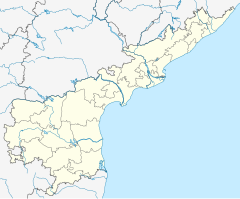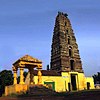Padmavati Temple
| Padmavati Temple, Tiruchanur | |
|---|---|
 Pradhana (Main) Gopuram of Shri Padmavati Ammavari Temple, Tiruchanur | |
| Religion | |
| Affiliation | Hinduism |
| District | Tirupati |
| Deity | Padmavati |
| Festivals | Brahmotsavam, Panchami Tirtham, Varalakshmi Vratam |
| Governing body | Tirumala Tirupati Devasthanams |
| Location | |
| Location | Tiruchanur, Tirupati |
| State | Andhra Pradesh |
| Country | |
| Geographic coordinates | 13°36′28.1″N 79°27′00.4″E / 13.607806°N 79.450111°E[1] |
| Architecture | |
| Type | Dravidian architecture |
| Specifications | |
| Temple(s) | 4 |
| Inscriptions | Sanskrit, Tamil, and Telugu |
| Elevation | 157.23 m (516 ft) |
| Website | |
| tirumala.org | |
| Part of a series on |
| Hinduism |
|---|
 |
Padmavati Temple[1] is a Hindu temple dedicated to the deity Padmavati (Alamelu Manga), the consort of Venkateshvara. The temple is situated in Tiruchanur area of Tirupati city in Tirupati district of Andhra Pradesh, India.
The temple is under the administration of Tirumala Tirupati Devasthanams and follows the pancharatra agama and vadakalai traditions.
Legend
[edit]It is believed that Hindu goddess Mahalakshmi was born as Alamelu to Akasha Raja, the ruler of this region, and wed Venkateswara of Tirupati. Lakshmi gave darshan to Venkateswara on a red Lotus flower (Padma in Sanskrit) at Alamelu mangapuram after his deep penance for twelve years. According to tradition, the goddess manifested herself in the holy Pushkarini called Padmasarovaram in a golden lotus. The Venkatachala Mahatyam states that the Sun-god Suryanarayana was instrumental in blossoming of the lotus in full splendour. A temple dedicated to Suryanarayana is situated on the eastern side of the Pushkarini. The Padma Purana gives a vivid description of the advent of the goddess and subsequent wedding with Venkateswara . The manifestation of Padmavathi occurred in the month of Karthika on Sukla Paksha Panchami when the star Uttarashada in the ascendent. The Brahmotsavam of the goddess is celebrated with all pomp and glory to commemorate the occasion.[2]
Deity
[edit]Padmavathi (or Alamelumanga) is the main deity of the temple. Padmavathi is the incarnation of goddess Lakshmi and is consort of Venkateswara. The deity is facing towards east.
Temple timings
[edit]The temple typically opens at 4:50 am on most days and closes at 9:30 pm. However, on Fridays, it opens at 3:30 am.[3]
Padmasarovaram
[edit]
Padmasarovaram is the Temple tank of the Padmavathi Temple. It is believed that Padmavathi manifested in this tank in a golden lotus.[4]
Festivals
[edit]In Padmasarovaram, Chakra Snanam will be held on last day of Annual Padmavathi Brahmotsavams (Panchami Teertham) which will witness lakhs of devotees taking a dip in the holy waters.[5]
Other temples in complex
[edit]
Krishna Swamy Temple and Sundararaja Swamy Temple are sub-temples within the Padmavathi Temple. Krishna Swamy Temple, dated 1221 CE, is the earliest of the temples inside the temple complex. Sundararaja Swamy Temple was built in the 16th century and is dedicated to Varadaraja Swamy (Vishnu) and his consorts Sridevi and Bhudevi. There is also a temple dedicated to Suryanarayana opposite to the temple tank. The icon of Suryanarayana is believed to installed by Venkateswara.[6]
See also
[edit]- Tirumala Venkateswara Temple
- Mahalakshmi Temple, Kolhapur
- Goddess Mahalakshmi
- List of temples under Tirumala Tirupati Devasthanams
- Tirupati
References
[edit]- ^ "SRI PADMAVATHI AMMAVARU TEMPLE, TIRUCHANOOR SEVA DETAILS". Retrieved 21 July 2015.
- ^ "Sri Padmavathi Ammavari Temple – Tirupati Tirumala Info". Tirupati Tirumala Info. Retrieved 25 January 2017.
- ^ "Padmavathi Temple Timings". Tirupati Balaji Online. Retrieved 8 October 2023.
- ^ "Tiruchanur spruced up for annual fete Premises".
- ^ "2 Lakh Take Holy Dip on 'Panchami Theertham'". Archived from the original on 10 June 2015. Retrieved 7 June 2015.
- ^ "Sub-temples at Tiruchanoor Premises". Retrieved 21 July 2015.
External links
[edit]- GeoHack - Padmavathi Temple
- Official website
- Sri Padmavathi Ammavari Temple
- Tirumala Tirupathi Devasthanams






